The UTSA chapter of Texas Rising distributed a series of street art posters, titled the “The Unapologetically Brown Series,” at the Main and Downtown campuses on Feb. 1, depicting current social issues.
Texas Rising is a program funded by the Texas Freedom Network Education Fund, a nonprofit, statewide organization that helps train grassroot leaders and activists on universities and college campuses across the state. These young, diverse and politically active Texans assist in leveraging power by engaging in community organizing, electoral politics and public policy advocacy. The movement advocates for sound public policies that address reproductive rights, voter suppression and LGBTQ equality.

Courtesy of Alejandro Lopez/The Paisano
President of UTSA’s Texas Rising chapter Nery Chavez, a junior global affairs major, spoke about the mission statement of the organization. “We focus on voter registration to mobilize young people to be able to vote and having their voices heard in the political process,” Chavez said. “We also hone in on LGBTQ eqaulity, immigrant rights, voting rights and reproductive justice.”
Chavez discovered “The Unapologetically Brown Series” through social media and wanted to bring it to UTSA.
“UTSA for me was an institution that allowed me to be unapologetic myself: unapologetically hispanic,” Chavez said. “I felt that, especially now with the political environment, it was urgent to bring a series like this that spoke to the different issues that a lot of UTSA students face, being a hispanic serving institution. Bringing these issues and having them in these visible spaces at UTSA; it can reflect our values and where we stand as far on immigration and just being unapologetically hispanic, black, brown or LGBTQ. I felt that this was a good reflection of our students.”
“The Unapologetically Brown Series” was created by Johanna Toruno, a Salvadoran artist based in New York. Chavez felt like he could identify with the artist and the issues she talks about. The “Creative House & Street Art Series” is meant to empower POC communities “by any means necessary.”
Toruno created the series to, “combat the whiteness on the streets, to combat the lack of representation in the streets,” as she said in an interview with Mitú, a media provider whose mission is to serve the Latino community.
Toruno came to the States from El Salvador, did not know the English language and felt alienated. “I wanted to feel a sense of community somewhere. I always wanted to feel like I belonged somewhere and I didn’t feel that way necessarily at all,” Toruno said. In creating the series, Toruno wanted to provide for others the space she created for herself.
Toruno frequently enjoys getting a backpack full of glue and posters and hitting the streets of New York, because she believes the streets are her most effective platform. Her goal was to translate the work outside of social media to make it accessible to those who don’t have Internet access.

Courtesy of Alejandro/ The Paisano
“I’m trying to reach people in the community, and some of those people aren’t going to have access to online,” Toruno said. “So, I want the posters to live outside in the wild because then they can tell a whole story that I don’t have to be there for. Building this, it’s not for myself. This is for my community. I want people to feel acknowledged. I want people to feel empowered.”
Like Toruno empowering others to pursue change, Chavez hopes that bringing this series to UTSA will inspire students to engage with new issues and the alternate views that are illustrated in these posters.
“Some of these issues are uncomfortable, and that’s the point: to galvanize students to critically think about these issues and look for the next step,” Chavez said.
As President of Texas Rising, Chavez plans on bringing more events like the “Unapologetically Brown Series” to campus in the future. He is currently working with the new Dreamer’s Resource Center at UTSA on a event that will take in place in April. The concept of the event will tie back in with the concept of being “unapologetic.”
Chavez is also working with MOVE San Antonio and other organizations on campus to motivate the student population to be involved with the community.
“I do think that our students are very bright and have the capacity to bring change to the San Antonio community and beyond,” Chavez said.





